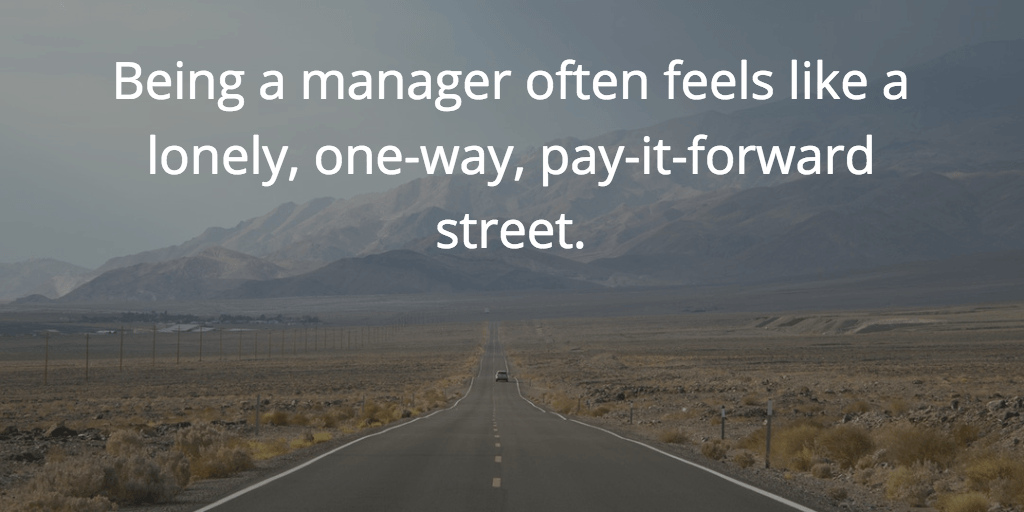What's the Ideal Manager-Employee Relationship?
You may have seen me featured as "The Candid Boss" for The Muse, an online career resource destination. One of the questions I am often asked is, can...
5 min read
Radical Candor Aug 7, 2025 5:11:56 PM
.png)
Thrown into a director role without having managed managers before? You’re not alone—and you’re more ready than you think. Radical Candor’s Kim Scott, Jason Rosoff, and Amy Sandler offer practical strategies to help you lead with confidence, candor, and compassion.
"Your job is not to solve management problems anymore. Your job is to help the people who work for you become better managers."
Radical Candor co-founder and CEO Jason Rosoff gets right to the point about what changes—and what stays the same—when you move from managing individual contributors to managing managers.
A recent Reddit thread brought this challenge to life:
"The job was not what I expected. I thought I was coming in as a senior manager—but mid-interview, it turned out to be a director role. I’ve never managed managers before, and now I’m suddenly responsible for 30 people. I want to do right by my team, but I’m anxious I’m in over my head."
That kind of curveball isn’t rare. Whether the title changed midstream or the job ballooned beyond expectations, plenty of people find themselves leading other leaders before they feel ready.
Here’s the good news, straight from Radical Candor author and co-founder Kim Scott: "At the core of being a manager, whether you're a brand new lead or a CEO of a 500,000-person company, the fundamentals are the same. Solicit feedback, give feedback, gauge how it lands, build a great team, and get stuff done."
According to Jason, transitioning from managing individual contributors (ICs) to managing managers means unlearning some habits that got you where you are.
"I made the mistake of trying to solve all the management problems myself. What I didn't realize is that my job had changed: I needed to think of my team as two teams—the managers who reported to me, and the broader team that reported to them."
Instead of solving every problem, your role now is to help your managers become better managers. You're no longer the problem-solver in chief—you're the coach. Your job is to multiply effectiveness, not to micromanage.
Amy Sandler, Radical Candor’s Principal Coach and podcast host, puts it this way: "One of the most damaging things new leaders do—often with good intentions—is to come in with a long list of plans. But before you change anything, you've got to listen. That’s the first act of leadership."
One crucial tool for new directors is what Kim calls "speak truth to power meetings." Twice a year, instead of holding a one-on-one with a direct report, gather their direct reports—without the manager in the room—to solicit feedback.
"This might feel awkward, even like a betrayal," Kim acknowledges. "But if done with care and transparency, it fights the gravitational pull of hierarchy that silences people. It's your job to help your managers improve, and you need to know how they're doing from the people they manage."
Amy adds, "Even with a ton of institutional trust, those conversations take courage. But they're essential if you want to build a feedback-rich culture."
She also emphasizes sequencing and timing: "You need to build enough trust first. Don’t just drop into a skip-level meeting cold. Start by soliciting feedback directly from your own direct reports. Model what it looks like to ask and listen. Then you can take the next step."
If you're stepping into a new team—especially one where communication has been rocky—your first job isn't to fix everything. It's to listen. That applies whether the team is high-performing or dysfunctional.
As Kim puts it: "If you go in and start making a bunch of changes before you understand the reasons for dysfunction, you're likely to do more harm than good."
So what if your boss is pressuring you to act fast? Kim recommends a clear and calm message: "If you want me to move fast, let me do it the right way. Leaping into action without context will slow us down."
Amy shares that some leaders get stuck between the desire to build relationships and the pressure to deliver outcomes. "You might be thinking, 'They hired me to shake things up, not sit around listening.' But listening is not passive. It’s a strategic move."
Listening doesn't mean inaction—especially when harm is being done. If someone on your team is creating a toxic environment, it's your job to step in. Jason shares an early career story where he was slow to act on a verbal bully in his org. "It took me too long to recognize the subtle signs. People were coping instead of thriving. I should have asked for help or acted sooner."
Kim echoes the sentiment with a story of her own. When a new hire used dismissive language toward women on his team, she hesitated to correct him. "I told myself I was waiting to get to know him better, but the truth is, I failed to do my job. When you see someone hurting others, you don't wait."
Amy acknowledges the complexity of these moments, especially for leaders from underrepresented groups. "When you're both the manager and the person experiencing disrespect, that’s a heavy emotional lift. But when you’re in charge, your job is to protect the people on your team—no matter your identity."
Whether the harm is intentional or not, managers of managers need to be hyper-aware of how communication lands. As Jason explains, "I'm more sensitive now to how things might be misinterpreted. It's about creating an environment where communication is always respectful."
That means being attuned to the tone in Slack, the dynamics in meetings, and giving your managers tools to navigate tricky conversations. As a leader, you don't just manage outcomes—you manage the emotional environment.
Amy adds, "Don’t underestimate the power of tone. Something that seems neutral to you might feel dismissive to someone else. Sensitivity doesn’t mean walking on eggshells—it means caring enough to check in."
Some quick-hit Radical Candor moves for managing managers:
Overwhelmed manager? Ask what they can stop doing. Maybe they need less, or maybe they need more of the right kind of challenge.
Avoiding feedback? Normalize the discomfort. Role-play the conversation and provide safety: "I'm here to support you no matter how it lands."
Siloed teams? Create cross-functional projects or rethink who gets to lead decisions. Incentivize collaboration, not hoarding.
Amy emphasizes the role of practice: "One of the best things you can do for a struggling manager is to rehearse a tough conversation with them. Let them fumble in private, so they can show up strong in the real moment."
If you're new to managing managers, don’t let pride get in the way of progress. Share your leadership plan with your boss and ask for feedback. As Kim says, "Going in and saying 'Here's my plan. Does this sound right to you?' shows strength, not weakness."
And once you're grounded in your approach, bring it to your team. Transparency builds trust.
Amy encourages seeking support, not just direction. "Find your pockets of safety. A mentor. A trusted peer. Someone you can ask, 'Does this feel off to you?' You don’t have to figure it out alone."
The leap from IC to manager to director isn’t about having all the answers. It’s about knowing which questions to ask, creating safety for people to speak honestly, and learning to amplify your impact through others.
Need more help ASAP? Ask our Radical Candor AI all of your questions, 24/7.
If you understand the importance of receiving feedback in the workplace, then you need The Feedback Loop (think Groundhog Day meets The Office), a 5-episode workplace comedy series starring David Alan Grier that brings to life Radical Candor’s simple framework for navigating candid conversations.
You’ll get an hour of hilarious content about a team whose feedback fails are costing them business; improv-inspired exercises to teach everyone the skills they need to work better together; and after-episode action plans you can put into practice immediately to up your helpful feedback EQ.
We’re offering Radical Candor readers 10% off the self-paced e-course. Follow this link and enter the promo code FEEDBACK at checkout.

You may have seen me featured as "The Candid Boss" for The Muse, an online career resource destination. One of the questions I am often asked is, can...

Edited By Brandi Neal, Radical Candor podcast writer and producer, and director of content creation for Radical Candor. This article about how...

*This post about how to apply Radical Candor in a crisis was originally written at the beginning of the pandemic. In the wake of recent mass layoffs...